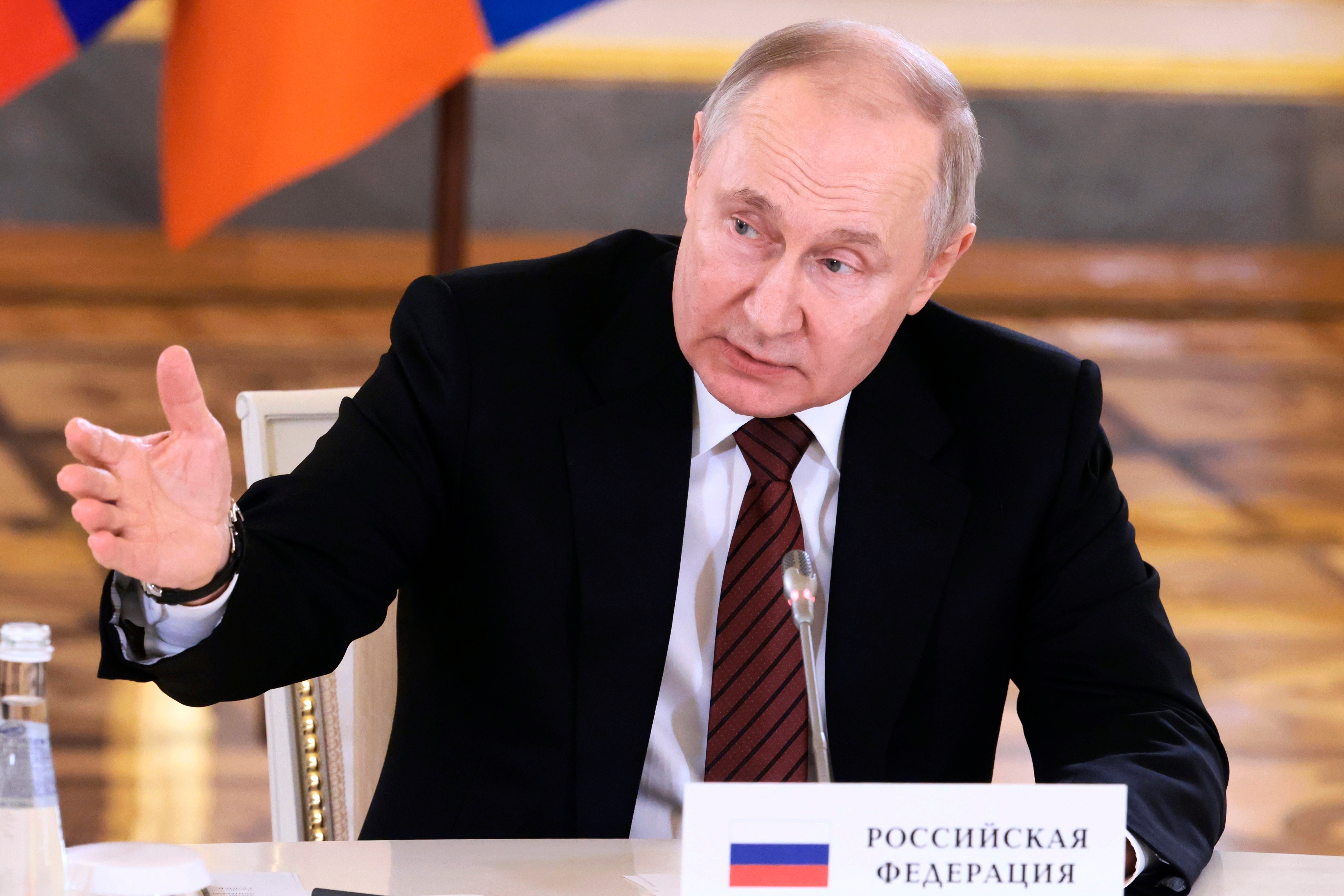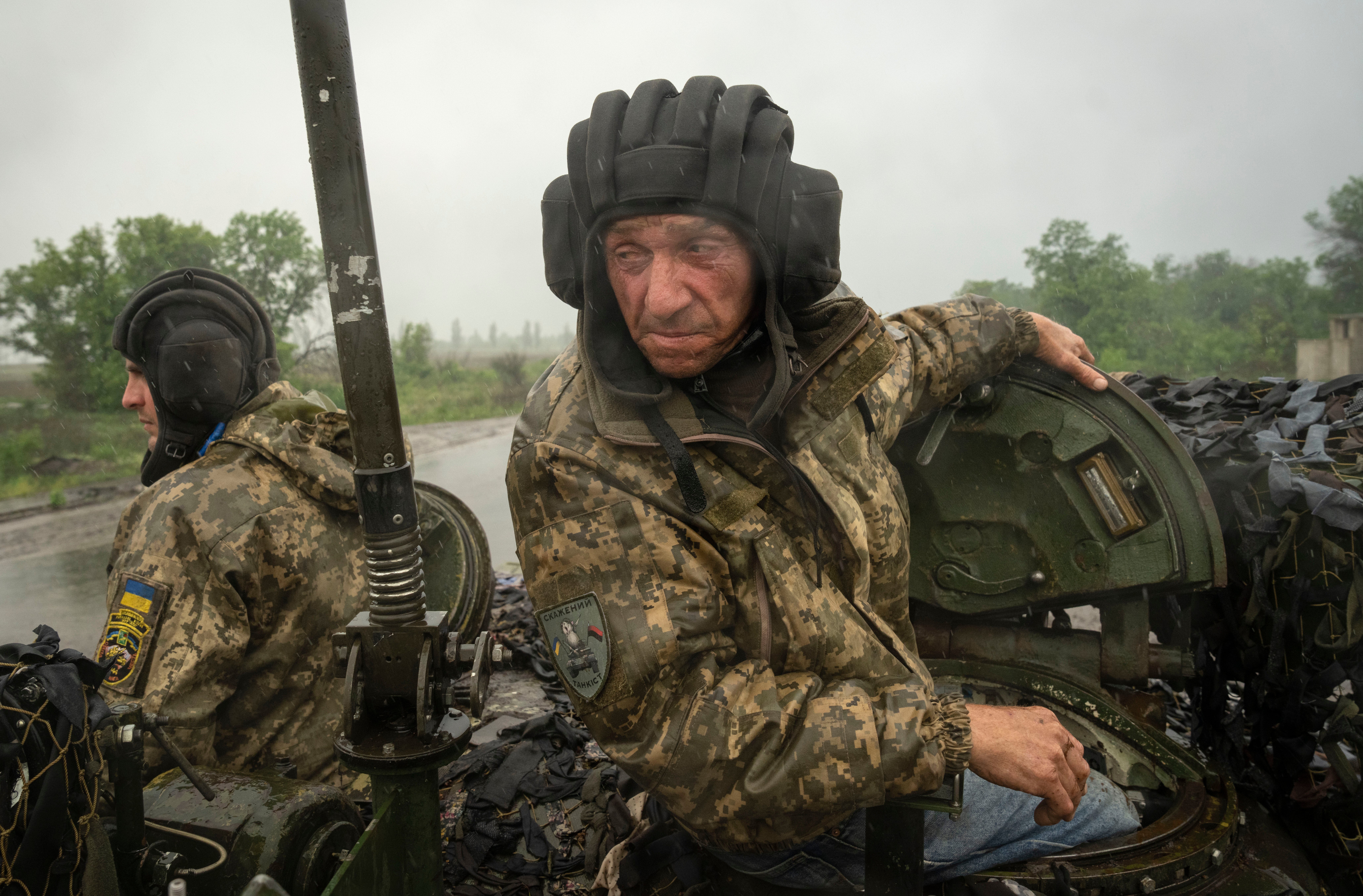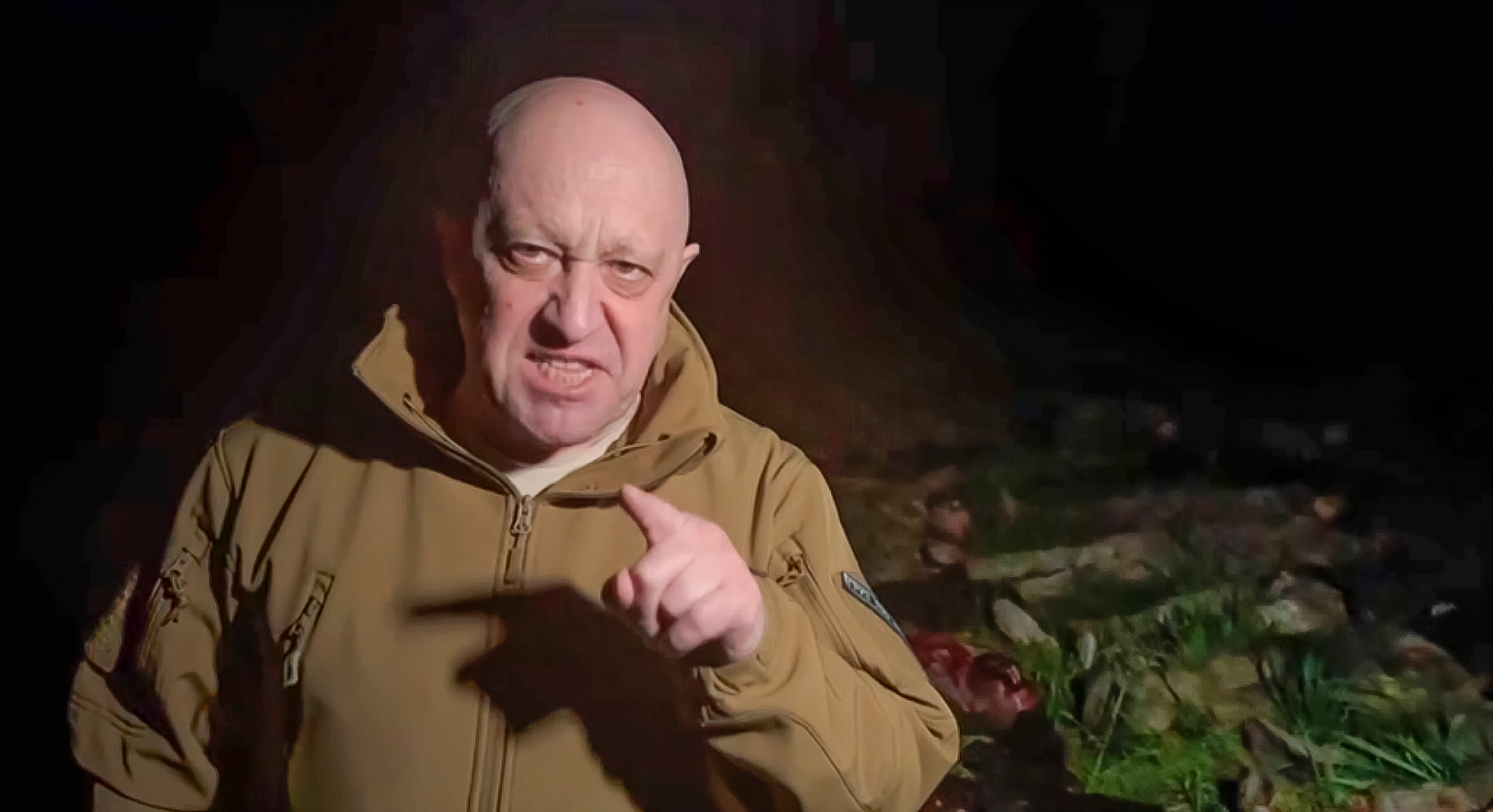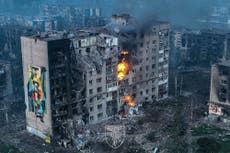Vladimir Putin’s Ukraine facade is crumbling – this week proves it
From nuclear threats to raids on Russian territory, Russia’s president has plenty on his mind, writes Chris Stevenson


Three claims have emerged during the past week on which Vladimir Putin would want his troops and the people of Russia to focus. First, that Moscow’s forces, leaning heavily on the Wagner mercenary group, have taken control of the eastern Ukrainian city of Bakhmut. Second, that a raid on Russian territory by anti-Kremlin militias was forced back and the fighters were “liquidated”. Third, that tactical nuclear weapons have been deployed to Russia’s neighbour and ally Belarus.
All of these elements are aimed at projecting a sense of strength – the idea that Putin, together with those around him, including his military chiefs, is in control of the invasion he launched 15 months ago seemingly with the intention that it would last for a matter of weeks. Scratch the surface, though, and the facade that the Russian president is trying to uphold begins to fall away.
Let’s start with the last – and simplest – of those events: the transfer of tactical nuclear weapons to Belarus. Putin announced the move in March; the papers formally authorising it were signed on Thursday; and the Belarusian president, Alexander Lukashenko, said later the same day that the weapons had already begun to be moved. The deployment, Russia says, is in response to “Nato aggression” – that is to say, the military support the alliance has provided to Ukraine.
This plays into Putin’s rhetoric about what he calls the existential threat posed to Russia by the West. Not just militarily, but culturally. The stance has hardened as Russia’s invasion has descended into stalemate on the bloody battlefields of southern and eastern Ukraine, with tens of thousands of soldiers being lost on both sides. Putin has repeatedly sought to evoke the memory of the Soviet Union’s fight in the Second World War, including battles such as Stalingrad, to rally both soldiers and civilians.
As the Kremlin has stretched to maintain this display of strength, various Russian officials have raised the spectre of nuclear war – the ultimate “us versus them”. Moving such weapons – even those with shorter ranges, generally intended to elicit battlefield advantage – to Belarus, which borders three Nato countries, works to make those threats feel more real. It also ensures that Western nations have to worry that Putin could try to force Lukashenko into a more active role in the Ukraine war.
Yet it smacks of increasing desperation. A move that highlights just how little progress Moscow has made on the battlefield, as Russian families continue to lose their sons in huge numbers.

The same can be seen in the claims about Bakhmut. It was not actually the Kremlin that made the call, rather Yevgeny Prigozhin, an ally of Putin who heads up the Wagner mercenary group. It is this force that Moscow has leant on during the months of bloody fighting around Bakhmut. There is little doubt that Russia controls much of the city, although Kyiv says its forces retain small footholds in some areas. But the cost has been high. Prigozhin has complained of losing 10,000 of the mercenaries and convicts that made up his forces in the area. And Russian losses as a whole are likely to have been significantly higher.
There is also little doubt that the city has taken on a particular symbolic significance for both Kyiv and Moscow, as both sides have thrown troops into what has become known as the “meat grinder”. But as the fighting has dragged on, the chance for Moscow to use Bakhmut as a launchpad for an assault on bigger cities across Donetsk and Luhansk has diminished. Kyiv has had time to fortify its defences, and will be hoping to roll back some of Russia’s advances during Ukraine’s long-anticipated counteroffensive.
As for Prigozhin, he has been a constant thorn in the side of the Russian military establishment. His disdain is clear in the many expletive-filled rants he has filmed from the area around Bakhmut. He has repeatedly complained of a lack of ammunition and support from Moscow for his forces, joked about the poor state of Russia’s troops compared to his own men, and on more than one occasion he has threatened to withdraw his soldiers from their positions – such threats being followed, days later, by announcements that more ammunition and supplies were on their way. His ire has been aimed at the Russian defence ministry, the officials inside it, and the generals in charge of the ground operation in Ukraine.

This week, seemingly in the belief that his work was done, Prigozhin declared that his forces were indeed starting to withdraw from positions in and around Bakhmut, and that he would hand over all of the Wagner positions to Russian troops by 1 June. The focus on Bakhmut has given him importance among the pro-war acolytes in Moscow, and will have been a source of embarrassment for the Kremlin. It is difficult to laugh off the rants of a man who is a central figure in one of the major theatres of war. Prigozhin’s ability to say the quiet part out loud jars with the Kremlin’s need to keep tight control on the information around the war. While those in Moscow who criticise the war can expect harsh jail terms, the Wagner chief has the freedom of the battlefield.
Prigozhin has also seen fit to put the boot into Russia’s war machine over the raid from Ukrainian territory into the Russian border region of Belgorod this week by anti-Putin Russian militias. Ukraine has denied involvement, as it has with a number of drone strikes and another previous incursion across the Russian border in March. While the Kremlin claimed the raid had been rebuffed, the leader of one of the groups held court on the Ukrainian side of the border a day later, saying: “I think you will see us again on that side.” The long-term aim of the two militias, they said, was eventually to “liberate” Russia from Putin.
Helpfully, Prigozhin posted an interview on his channel on the Telegram messaging app in the wake of the raid, warning that Russia could face “revolution” if its leadership does not improve its handling of the war, including the welfare of the soldiers it sent to fight.

“This divide can end as in 1917, with a revolution,” he said. “First the soldiers will stand up, and after that, their loved ones will rise up. There are already tens of thousands of them – relatives of those killed. And there will probably be hundreds of thousands – we cannot avoid that.”
The military blogosphere, which has millions of followers, including war hawks in Moscow, seemed surprised at the raid across the border and how it showed up the gap in Russian defences. While fear of Ukrainian attacks is a useful means by which Putin can keep support for the war high among the Russian people, it is undercut by dissent and disbelief.
The pull of the ultra-patriots in Moscow – whether they are political figures or social media influencers – only serves to box the president in, forcing him down certain paths, or at least leaving him little room for manoeuvre. His own apparent need to portray a strongman image acts as a further straitjacket.
There was a further example of this on Friday, when former Russian prime minister Dmitry Medvedev – a staunch Putin ally – said the conflict could last for “decades”.
“This conflict will last for a very long time. This is a new reality,” said Medvedev, now the deputy chair of the security council, according to Russian state media. Medvedev, who cast himself as a liberal moderniser when he served as president from 2008 to 2012, now presents himself as a fiercely anti-Western Kremlin hawk. Diplomats say his views give an indication of thinking among the Kremlin elite.
Also spouting the same talking points, that the West is seriously underestimating the risk of a nuclear war over Ukraine, Medvedev suggested that the government of Ukrainian president Volodymyr Zelensky needs to be removed, as any peace would only be short-lived. The message was intended to stoke morale, but his admission that the “special operation” is now set for the long haul only served to undermine the Kremlin.
Putin has long relied on the legitimacy provided by popular support, and on his coercive power exercised through the law and state media. He is pulling on all the levers, but the cracks are beginning to show. Russia still has plenty of military might to call upon – and the fighting certainly has a long way to go. But the facade being held up by the Kremlin, of the war going in Putin’s direction, continues to fall apart.
Subscribe to Independent Premium to bookmark this article
Want to bookmark your favourite articles and stories to read or reference later? Start your Independent Premium subscription today.






Join our commenting forum
Join thought-provoking conversations, follow other Independent readers and see their replies
Comments